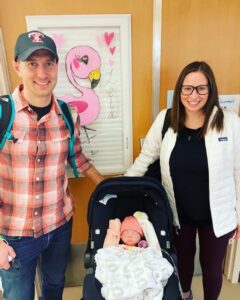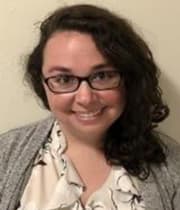Finding community in NICU support program

On Sept. 7, 2021, trauma psychologist and expectant mother Rachel Spero-Hoy, PhD, moved to Puyallup, Washington, with active-duty Army husband Maj. Eric Spero-Hoy.
The couple had planned to start renovating their new home and acquaint themselves with their new community, but three days later, Rachel began to bleed.
Life in the NICU

Rachel holds her 5-day-old daughter for the first time.
Rachel rushed to nearby MultiCare Good Samaritan Hospital where she was diagnosed with placental abruption, a complication that occurs when the placenta separates from the uterine wall before birth.
Surgery brought her baby, at 26 weeks gestation, into the world. Minutes after first meeting, Rachel’s tiny daughter was transported to MultiCare Tacoma General Hospital’s Level IV neonatal intensive care unit (NICU), now part of MultiCare Mary Bridge Children’s Hospital.
Rachel remained at Good Samaritan for several days, healing before she reunited with her newborn.
“When I could see her in the NICU, my blood pressure stabilized,” Rachel remembers. “She was there for three months, as she had to grow, and she really struggled with her lungs. Every day it was just showing up, learning more, supporting her where I could; it was all very much a blur thinking, ‘We have to get discharged; we have to get her healthy.’”
A guiding light in Parenting Partnership
Like many in her shoes, Rachel believed that leaving the NICU would mark the end of her family’s trying journey. But life post-discharge held its own set of difficulties, like learning to monitor her baby’s oxygen, keeping her weight up and ensuring she stayed healthy.
That’s when MaryAnn Fortunato, MSW, LICSW, a family support social worker at Mary Bridge Children’s Parenting Partnership, entered the picture. 
“Parenting Partnership is a home visitation support program that helps families manage the challenges and joys of the first three years of life after leaving the NICU with their baby,” Fortunato explains. “Our goal is to strengthen attachment through attentiveness to cues, assure a safe environment for baby and strengthen parents’ understanding of child development given their child’s medical complexities.”
Established in 1998, the program includes accompanying families to medical appointments and procedures; assisting with accessing developmental services; addressing questions about feeding, weight gain and medical concerns; being a listening ear and advocate; and offering peer support groups.
With about half of its operating budget funded by generous Mary Bridge Children’s Foundation donors, Parenting Partnership is available at no cost to families .In those early weeks,
Rachel was overwhelmed by all she was expected to balance — there simply weren’t enough hours in the day to accomplish everything. Fortunato immediately became a steady, reassuring presence.
“I just remember MaryAnn telling me, ‘You can do this — it’s not going to be like this forever, and you don’t have to do it all perfectly,’” Rachel shares. “And I felt the weight release from me — I don’t think I could have ever told myself that and believed it.”
The first three years
Over the next three years, Fortunato met Rachel where she was — virtually to begin, in person post-pandemic and monthly toward the end. She was present for many of Rachel’s daughter’s milestones, including some of her first steps, and built a relationship with the entire family.

Discharging from the NICU.
“Rachel is a wonderfully attentive, caring and engaged mother who is open to being vulnerable and receptive to the support offered,” Fortunato says. “Together, Rachel and her husband Eric demonstrate a strong commitment to their daughter’s well-being, creating a nurturing and loving environment for her.”
Fortunato also connected Rachel with Postpartum Support International, which in turn set her up with a therapist specializing in supporting NICU families, as well as navigating postpartum depression and post-traumatic stress disorder (PTSD). Rachel credits Fortunato with serving as a springboard to her PTSD recovery.
“As a PTSD specialist, I know that the number-one thing that keeps people from recovering is avoidance, and when you have medical trauma, the desire to hide and not go to appointments is really, really strong,” Rachel explains. “By going to these appointments with me, MaryAnn was a therapeutic intervention to reduce that avoidance. I knew I was going to have a trusted, safe person with me who would be a second set of ears, who would be there to help me advocate if I faltered and who had my best interest at heart.”
A ‘de facto community’
After her NICU and Parenting Partnership experience, Rachel has been inspired to expand her career focus from combat trauma to birth and medical trauma, helping others on similar journeys.
She’s also grateful for the support of a “de facto community” of donors she’d never even met, at a time when her family hadn’t yet established roots.
“We received diapers and wipes and gift cards multiple times throughout our time in the program, and it felt like a gift for just existing,” Rachel shares. “It was just such a blessing to know that there were people who cared enough about where we were in our lives, and the struggle that we were going through, to give us that gift.”
Fortunato echoes Rachel’s thankfulness.
“Parenting Partnership would like to thank donors for their willingness to support the medically fragile infants and their vulnerable families in our community,” she says. “We’ve witnessed amazing outcomes with families over the years because of their generosity.”




